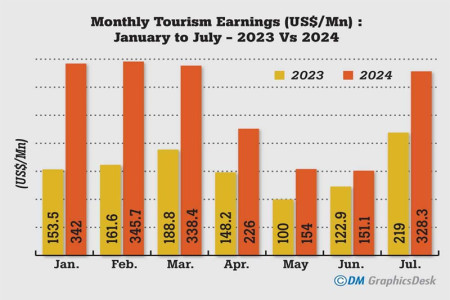Sri Lanka has earned a robust income of US$ 328.3 million from the tourism trade in July at a level nearly equal to what the country gets from the International Monetary Fund (IMF) for six months for raising taxes of its people and corporations and perhaps on their properties and capital gains, which will most likely continue under any new President favoured to win the upcoming election.
Sri Lanka’s economy and more specifically its external sector was buttressed by the strong inflows that came from tourism and remittances among others until the Easter attacks slowed it down before the pandemic decimated it as the border closures by countries due to the fear of further spread of the Corona virus brought the travel and tourism industry to a near halt.
Arrivals reached the pre-pandemic levels early this year, helping the country to earn more money while lifting some local industries which were mostly driven by the foreign visitors.
July earnings were more than twice of what the country received in June (US$ 151.1 million).
This was because the country in July entered into the next season for arrivals after a slow arrivals season in the prior three months.
In July, Sri Lanka saw 187, 810 tourists coming in, well above the 113,470 June figure.
So far in August in the first 19 days of the month, 117, 825 visited the country, bringing the total arrivals in the year upto August 19 to 1,315,884. By the end of August, Sri Lanka will end up slightly below the 1,487,303 tourists figure it welcomed in the whole of 2023.
Sri Lanka aims roughly around 2.4 million arrivals by the end of the year, but could end up slightly below that level.
Meanwhile, earnings from tourism in the first seven months were US$ 1,884.9 million, up by a robust 72.3 percent from the same period last year.
Sri Lanka aims to collect between US$ 3.5 to US$ 4.0 billion in earnings for the year.
DM


